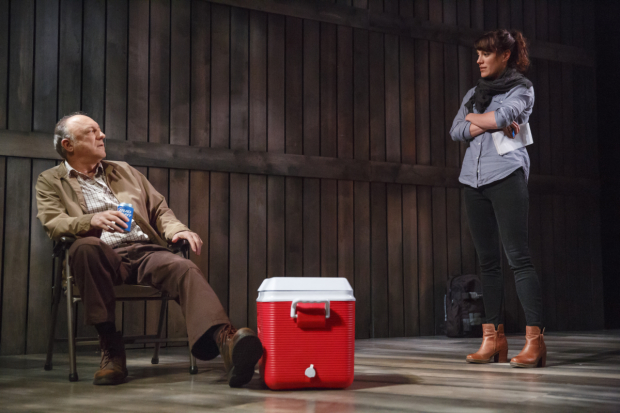
(© Joan Marcus)
Who wants to hear a feminist ghost story? If your hand just shot up, get thee to the McGinn/Cazale Theatre for the world premiere of Emily Schwend's The Other Thing, which is being produced by 2ST Uptown (Second Stage's uptown division). A gifted storyteller, Schwend (Take Me Back) certainly knows how to send tingles up one's spine with this gruesome tale, which may leave some members of the audience reexamining their own irrational rage.
Kim (Samantha Soule) is a freelance journalist writing a piece about paranormal investigators. She meets ghost hunters Carl Tapp (John Doman) and his son Brady (James Kautz) for a late-night interview outside a rural Virginia barn they believe is haunted. Meanwhile, Kim is haunted by a ghost of her own: the spirit of her dead mother, a woman so full of anger at men, she occasionally emerges into the mortal world to go on a murderous rampage. Kim fears for the men in her life, including her sensitive nebbish ex-boyfriend Thomas (Bhavesh Patel), a fellow journo with whom she's recently split. Will any of them survive the wrath of mother?
The title of the play might refer to the author's tendency to ramble. Carl tells meandering stories while clutching a Bud Light. Kim (or a version of her) goes on long screeds. One gets the sense that this same story could be told in 90 minutes, rather than two hours. Despite her lack of brevity, Schwend still captivates us with her tale, which director Lucie Tiberghien stages like a real mistress of the dark. Actors disappear into the shadows and behind the slatted walls of Kris Stone's set.
This is augmented by a truly terrifying performance by Samantha Soule, who has the most lethal grin off-Broadway. Like all the best villains, she's one that you can really get behind at times, especially when she starts to rant. "I hate men like you," she spits at Carl, adopting her mother's voice. "Everything is so clear to men like you. What’s right, what’s wrong, what’s insignificant. You love telling us how we think and feel. Carl, the authority on everything and everyone." She's not going to take any "mansplaining" from these dolts, and you don't blame her for that one bit.
But there's something insidious about mamma's feminist righteousness: For instance, why is the brunt of her ire reserved for working-class men? She marches out of her Georgetown apartment (created with a modern-yet-decorative flair by Stone) wearing her leather Kenneth Cole boots and dangly scarf, looking like a Zara catalog model (Beth Goldenberg's costumes scream loud and clear where each character lives in the pecking order). Conversely, the Tapps are wearing last season's Kmart. "Men like you don’t really matter," she tears into Carl, scoring blow after blow against this man who is holding on to a shred of dignity through his little ghost-hunting business in spite of decades of neoliberal economic policy that has made his rural way of life increasingly ridiculous. Talk about speaking power to truth.
And while Carl and Brady are certainly jerks, Doman and Kautz offer ample displays of their vulnerability that make you root for their survival. Kautz, in particular, portrays a deeply insecure man facing a dead-end life of few prospects. Doman's Carl is more delusional. Patel's Thomas seems equally clueless and harmless. Are these really the most egregious perpetrators of misogyny that Schwend could think up?
Of course, it is entirely possible that Schwend's selection of such pathetic beta males was intentional. These whipping boys are a poor representation of the forces truly oppressing women in America, but they are a pretty accurate representation of who typically gets the blame. She wraps it all in a chilling homage to the horror genre. Few things could be more American than a slasher play about our own misplaced and hypocritical rage.









